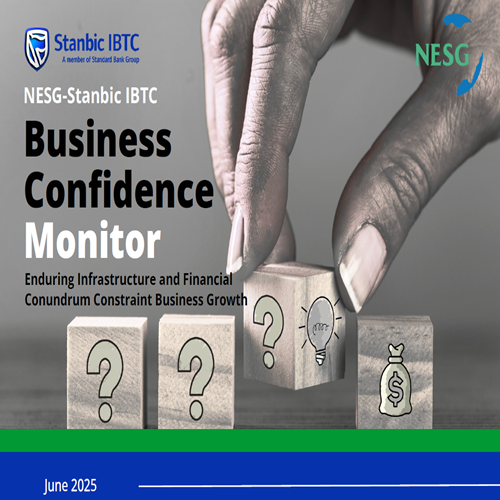By Atoyebi Nike
Nigerian businesses maintained a cautiously optimistic outlook in May 2025, marking the fifth consecutive month of growth, according to the latest Business Confidence Monitor released by the Nigerian Economic Summit Group (NESG), in partnership with Stanbic IBTC.
The Current Business Performance Index for the month stood at +9.78, indicating mildly positive activity across the economy. However, the figure reflects a slight decline from April’s performance, which recorded a stronger index of +12.29. The NESG survey, which draws from the views of business managers across sectors, evaluates short-term expectations on core economic indicators including investment levels, pricing trends, production activity, and employment dynamics.
Despite the overall positive sentiment, the report pointed to a noticeable deceleration in business performance across most sectors, with the exception of manufacturing, which remained relatively resilient. The agriculture sector recorded a negative index of -1.77, primarily due to persistent structural challenges and worsening climate conditions such as prolonged droughts, erratic rainfall patterns, extreme heat, and shorter wet seasons. Meanwhile, sectors like non-manufacturing, manufacturing, trade, and services recorded positive but slowing growth levels.
According to the report, the business environment continues to face significant hurdles, most notably inadequate power supply, which remains the single largest obstacle to expansion. Business operators also highlighted continued difficulties in accessing finance, rising commercial lease and rental costs, limited availability of foreign exchange, and the destabilizing impact of renewed security threats on operations.
The report also showed a decline in the cost of doing business, with the index falling to +38.54 in May from +51.79 in the previous month. While some improvement was noted in production levels, operating profits, cash flow, and job creation, investor confidence took a sharp hit, dropping by -25.61. A fall in price levels by -18.15 also contributed to the reduced pace of economic activity.
The survey revealed that inconsistent economic policies and worsening insecurity have compounded existing structural issues, leading many businesses to adopt a more cautious stance on investment and expansion. Limited financing options have continued to constrain growth, particularly for small and medium-sized enterprises.
The NESG stated that while Nigeria’s economy is showing resilience, the government must take urgent and coordinated steps to address the persistent infrastructure gaps, restore investor confidence, and create an enabling environment for sustainable business growth.


